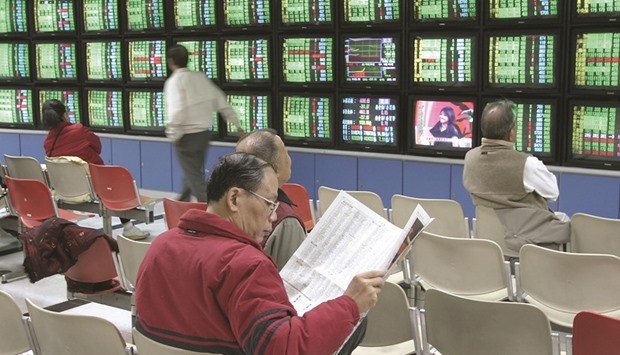Asian stocks headed for their biggest weekly advance in three months as data suggested China’s economy is responding to government support. Taiwan became the latest regional bourse to enter a bull market.
The MSCI Asia Pacific Index rose for a fifth day, adding 0.4% to 133.84 as of 4pm in Hong Kong.
That took its weekly gain to 4.4%, the most since April 15. Japan’s Topix index closed up 0.5%, rising 8.9% for the week in the biggest advance since 2009. China’s economic growth held at 6.7% in the second quarter from a year earlier, beating the 6.6% expansion forecast in a Bloomberg survey.
More than $4tn has been added to the value of global equities since June 27 as the US economy shows signs of health and speculation increases that policy makers worldwide will boost stimulus to stave off a global slowdown.
Japanese shares led gains this week and the yen fell the most since 1999 after Prime Minister Shinzo Abe’s party won upper-house elections, giving him a fresh mandate to boost efforts to revive the economy.
“We’re seeing better-than-expected growth, particularly in the US economy, and we’ve got a higher likelihood of central bank stimulus,” Michael McCarthy, the Sydney-based chief market strategist at CMC Markets, told Bloomberg Radio. “These ideas are opposing, but at the moment they are both supporting equities. At some point there is going to have to be a resolution of that.”
China’s June factory output, retail sales and new lending also topped estimates, while investment slowed. The US also has a data dump coming on Friday, with gauges of household spending, inflation, industrial production and consumer confidence scheduled.
China’s Communist Party leaders plan to double the size of the economy by 2020 from 2010 by stoking growth drivers based on innovation and services, re-balancing away from a focus on manufacturing sectors.
“It was good to see, for once, a little bit of positive news” from China, said Sam Le Cornu, co-head of Asian listed equities at Macquarie Investment Management. “This re-balancing act is playing out currently okay.”
Fast Retailing Co jumped 18% in Tokyo, the most since 1998, after the Uniqlo clothing chain owner posted a profit that beat estimates. Nintendo Co surged 9.8%, bringing this week’s gains to 71%, as its Pokemon Go mobile game became a worldwide craze. Line Corp shot up 32% in its Japan trading debut after the messaging company raised more than $1bn in the biggest technology initial public offering of the year.
Australia’s S&P/ASX 200 Index climbed 0.3%, South Korea’s Kospi index advanced 0.4%, while New Zealand’s S&P/NZX 50 Index slipped 0.1%.
Singapore Exchange reopened after a disruption shut trading on Thursday, prompting an apology from Chief Executive Officer Loh Boon Chye. Southeast Asia’s biggest bourse was forced to halt operations because of a technical malfunction, and it failed to follow through on two pledges to reopen. The benchmark Straits Times Index climbed 0.6%.
Hong Kong’s Hang Seng Index gained 0.4% and the Shanghai Composite was steady. The 14-day relative-strength index on the mainland Chinese gauge this week edged above 70 for the first time since just before last summer’s $5tn rout. Some traders see this as a signal the market is overbought.
Taiwan’s Taiex index rose 0.9%, closing more than 20% above its low in August, as global investors pumped cash into the island’s equities, drawn by upbeat earnings and high company dividends. Thailand, India and Indonesia have also recently entered bull markets.
India’s S&P BSE Sensex Index lost 0.3%. Infosys slumped 8.2% as its cut its annual sales forecast due to companies worldwide reining in information-technology spending and shifting to cloud-based software services.
E-mini futures on the S&P 500 slipped 0.1%. The underlying equity gauge rose 0.5% to a record on Thursday as better-than-forecast profit figures from JPMorgan Chase & Co boosted optimism for bank earnings.

Traders keep an eye on the share prices of Taiwan Stock Exchange at a securities trading company in Taipei (file). Taiwan became the latest regional bourse to enter a bull market.
